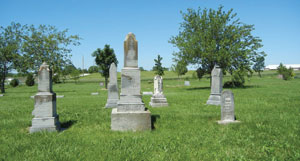 The B’nai Israel Cemetery in Eudora, Kan., owned and maintained by the Lawrence Jewish Community Congregation, has been placed on the National Register of Historic Places. The congregation learned of the designation last month.
The B’nai Israel Cemetery in Eudora, Kan., owned and maintained by the Lawrence Jewish Community Congregation, has been placed on the National Register of Historic Places. The congregation learned of the designation last month.
Loraine Lindenbaum, a member of LJCC and its cemetery committee, said the cemetery currently contains 42 graves, all Jewish. However the bylaws indicate that if one spouse is not Jewish he/she is allowed to be buried at B’nai Israel. A halachic area is set aside and there is water available on site for washing.
Lindenbaum notes there are several reasons this historical designation is important for the cemetery.
“It protects the property from encroachment as the surrounding land is developed,” Lindenbaum said. “The designation also signifies to our LJCC membership what a gem we have locally — it essentially puts us on the map as far as being the only Jewish cemetery in Kansas that reflects the participation of Jewish immigrants from Eastern Europe to the state of Kanas in the early 1860s with this important title.”
Lindenbaum said Ben Terwilliger of the Eudora Area Historical Society first suggested the congregation seek the historic designation for the cemetery. Once the congregation decided to proceed, it took approximately a year-and-a-half for the cemetery to be named to the historic register.
According to the Kansas State Historical Society, the cemetery was established in 1858 and is the only surviving property associated with the Jewish community in Eudora, which flourished briefly from 1857 to 1867 before moving to Lawrence. Jewish settlers were among the first Eudora residents. Of the 29 heads of families who arrived in Eudora in 1857, approximately seven were Jewish.
Many of Eudora’s early Jewish family names, such as Urbansky, Cohn and Katzenstein, grace the headstones of the B’nai Israel Cemetery. In 1868, the Jewish community in Lawrence organized as the Society of Beni Israel under the leadership of seven trustees and assumed responsibility of the cemetery. Burials continued at the cemetery until the late 1920s; the cemetery remained largely idle until it was reactivated in 1978.
Over time, the cemetery came to represent the Jewish community in Lawrence and Douglas County and remains today as a reflection of their collective history and religious and ethnic identity during the late 19th and early 20th centuries. It was nominated for its local significance in the areas of early settlement social history.
Terwilliger notes that cemeteries are rarely added to the National Register of Historic Places. Kansas has nearly 1,300 sites and properties on the register and only eight are cemeteries.
“The fact that the B’nai Israel Cemetery is now on the National Register indicates that it is one of the most remarkable and unique cemeteries in the state of Kansas,” Terwilliger said.
David Katzman, a KU professor who is a member of LJCC and the cemetery committee, said for a long time, as a rural cemetery amidst farms, the cemetery retained a pastoral atmosphere. In research he presented as the designation was being sought, he wrote, “Today it is threatened by development as the surrounding farms give way to suburban development, the Eudora High School, and institutional structures.”
In recent years the LJCC has reacquired property it had originally owned, “thus restoring the cemetery to its original 2 acres, and has begun turning the grounds back to cemetery use,” Katzman added.
The words Beni Israel are written on the plaque affixed to the gate. Lindenbaum said many at the LJCC feel that Beni was either written in error or was the popular spelling of the time. Today the congregation refers to it as B’nai Israel.


